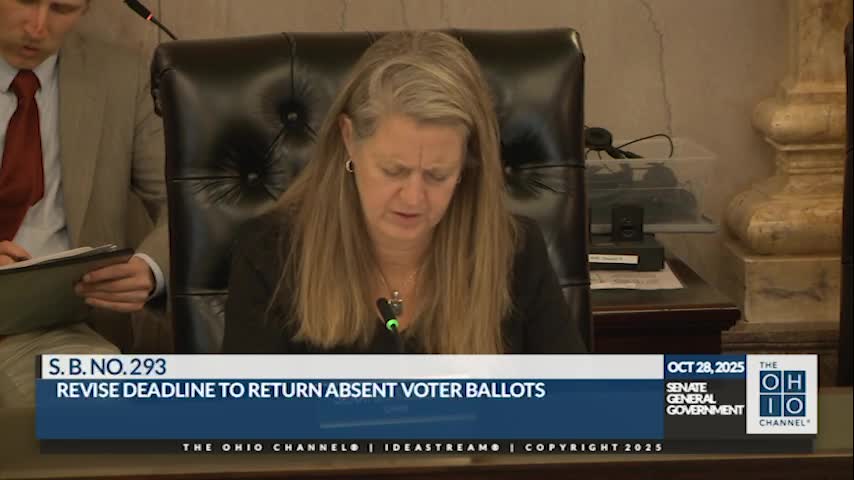Fourth hearing on SB 153 draws split testimony on citizenship checks, list maintenance, drop boxes and petition rules
Get AI-powered insights, summaries, and transcripts
Subscribe
Summary
Substitute Senate Bill 153 received a fourth hearing in the Ohio Senate General Government Committee; Secretary of State Frank LaRose and other proponents urged codifying front-end citizenship verification and strengthening list maintenance, while election officials and advocacy groups warned the bill could create new barriers and operational burdens.
Substitute Senate Bill 153 received a fourth hearing before the Ohio Senate General Government Committee, with Ohio Secretary of State Frank LaRose among the in-person proponent witnesses and dozens of others offering testimony both for and against the bill's provisions on citizenship verification, voter-list maintenance, absentee voting protections and petition-circulator requirements.
LaRose, Ohio’s chief elections officer, told the committee he supports several elements of the subbill and urged legislative action to align state law with federal expectations after the U.S. Department of Justice raised concerns about Ohio’s absentee-ballot return deadline. LaRose said his office has begun using federal datasets, including the Department of Homeland Security SAVE system and Social Security Administration data, to verify registrations and that the legislation would codify and expand processes used to resolve mismatched registration records, inform affected voters and, when necessary, require provisional ballots or remove unresolved registrations.
Proponents — including Beau Eaton of FGA Action and Chad Ennis of Honest Elections Project ACTION — supported front-end citizenship verification, more aggressive list maintenance using state and federal data, and restrictions on unattended drop boxes. Ennis said the approach first focuses on populating missing fields (driver's license, last-4 SSN, DOB) to enable accurate matches and that a delayed implementation period (the subbill includes an 18-month implementation window) recognizes system reprogramming needs.
Opponents and local election officials — including Peter Maxwell, a precinct election official in Franklin County, and Bob McAllister of the Lawrence County Board of Elections — warned the bill would increase provisional ballots, lengthen lines, impose unfunded mandates and risk disenfranchising voters who lack immediate documentary proof of citizenship or whose records contain minor clerical mismatches. The League of Women Voters of Ohio and voting-rights advocates said the proposal risks making direct democracy harder by creating new grounds to invalidate petition booklets and by requiring compensated circulators to wear badges and submit to in-state jurisdiction.
Several witnesses raised specific concerns about the petition-circulator provisions. Opponents said mandatory badges would confuse or intimidate volunteers and could lead to frivolous complaints if tags were lost or blown off; proponents argued badges and a jurisdiction clause improve transparency and accountability for paid circulators. Testimony also flagged practical implementation questions: county boards are still implementing parts of previously passed election laws, federal HAVA funding to counties has been reduced, and vendor and county system upgrades will be required to implement front-end verification.
What the bill would do (as described in testimony): codify the SAVE-based citizenship checks, require outreach and a postage-paid form for voters whose records mismatch, require provisional ballots if errors are not corrected in person, permit removal of registrations that do not respond, and prohibit unattended drop boxes while preserving staffed drop-off options. Proponents emphasized litigation avoidance, administrative clarity and elevated public confidence; opponents emphasized access, timelines, resource constraints and the potential for disenfranchisement.
The committee did not take a final vote on SB 153 at this hearing. Committee members and witnesses agreed some implementation steps will require system and staffing upgrades and further legislative detail; supporters and critics asked for additional input from county boards of elections before final action.
